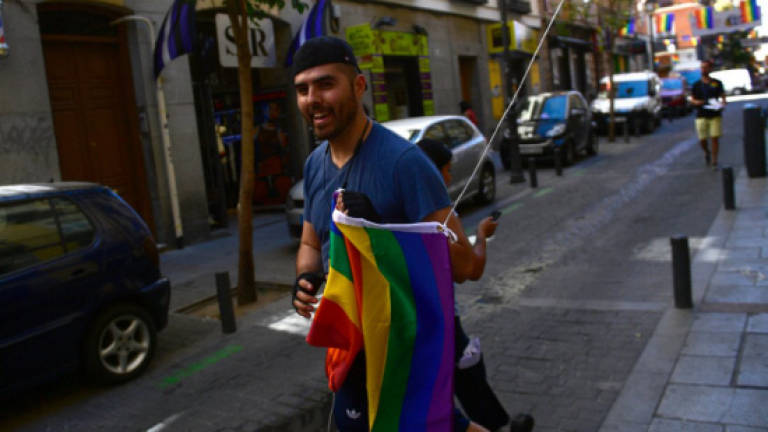Madrid gears up for WorldPride march

MADRID: Hundreds of thousands of revellers are poised to take to the rainbow streets of Madrid Saturday in the world's biggest march for gay, lesbian, bisexual and transgender rights.
From 5:00 pm (1500 GMT), carried along by the slogan "Viva la vida!" (Live life!), the parade of 52 floats will start partying its way through the centre in celebration of sexual diversity, under high security.
Authorities and organisers expect one to two million people to attend the march of drag queens, scantily-clad men and other revellers in the 3.1-million-strong Spanish capital, which has become a global reference in LGBT openness.
By comparison, between 800,000 and 1.2 million took part in last year's regular Gay Pride parade in Madrid according to different estimates, says Jesus Grande, president of Madrid's Cogam LGBT Collective, an organiser.
'Political' message
But beyond the fiesta and glitz of an event accused of becoming too commercial, organisers say it is "a political demonstration."
Two huge banners will be deployed, says Jesus Generelo of Spain's LGBT Federation.
"One of them, essential, for the rights of LGBTI all over the world," he says, referring to lesbians, gays, bisexuals, transgenders and intersex people who are born with a sexual anatomy that can't be defined as male or female.
"The other to send a message that you can't consider 'trans' people as sick people," he adds.
Forty years after Spain's gay community started to march for its rights in Barcelona, the country is now held up as an example of LGBT acceptance.
But it wasn't always so.
During the nearly 40-year reign of dictator Francisco Franco – whose rule was blessed by the church in Roman Catholic Spain – homosexual acts were illegal and thousands of gays were shipped off to rehabilitation centres, or even jailed.
Spain emerged from Franco's conservatism in the late 1970s into an exuberant era of liberal reforms and social freedom, with director Pedro Almodovar breaking ground with openly gay and trans characters in his films.
In 2005, Spain became the third country after the Netherlands and Belgium to legalise same-sex marriage.
By comparison, Germany only approved it on Friday.
'Generalised threat'
"We have achieved a lot but in other countries in the world – and even in Spain in small villages – you have to continue to fight," Jesus Gonzalez, a 41-year-old Spanish photographer, said this week at the official start of WorldPride 2017.
He said that in other parts of the world, "people are still being killed because they are different from what society requires".
According to the ILGA, an international LGBTI association, intercourse between people of the same sex is still illegal in 72 countries.
The death penalty, meanwhile, is implemented in Iran, Saudi Arabia, Sudan and Yemen, and in parts of Nigeria and Somalia.
For the fifth WorldPride since 2000, organisers have called to protest in solidarity with those who cannot raise their voices in places such as Russia's Chechnya.
Still, some of the LGBT community has criticised the presence of floats sponsored by Netflix, eBay and Google.
Another dark cloud is the background of high tension across Europe, hit by a string of attacks.
"There is no specific terrorist threat but a generalised threat," German Castineira, operations chief for Madrid police, told reporters this week.
Thousands of police, firefighters and other security agents have been mobilised for the event, and two emergency lanes for possible evacuations are planned along the route on one of Madrid's central avenues.
Traffic restrictions, bag searches and mobile medical units are also in place. — AFP